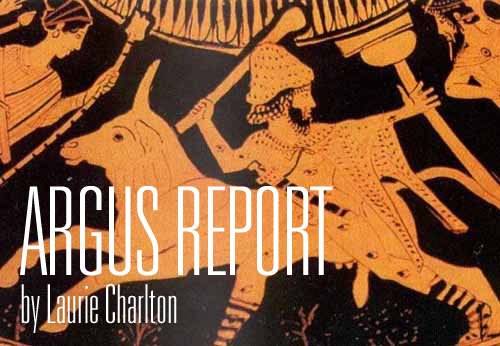OP/ED: To CCC, or not to CCC? That is the question as council contemplates "financial suicide"
Just as Hamlet contemplated suicide in Shakespeare’s play, Council is contemplating financial suicide for the taxpayers of Rossland. Earlier this year, CAO Victor Kumar urged Council to rescind the Development Cost Charge (DCC) bylaw. Mayor Granstrom and his happy band of robotic rubber-stampers were happy to oblige. Only Councillor Kathy Moore was opposed to the repeal. Councillor Cary Fisher rightfully declared a conflict of interest and did not participate in the discussions.
Mr. Kumar has done a flip-flop with his recommendations about getting developers to pay for the infrastructure they require.
In 2010, Mr. Kumar first floated the idea of a “connection fee” for all “new” properties in town whether they imposed a capital cost burden on the City or not. At that time, he recommended that Council wait until an Infrastructure Assessment Report (IAR) was completed before making a decision about DCCs. The IAR was finally completed in early 2011 but, other than the sewer upgrades associated with the Columbia Avenue project, not one project that the DCC bylaw identified as being required for development primarily at Red Mountain was even mentioned in the report. Waiting for the IAR simply delayed consideration of amendments to the DCC bylaw.
In July 2011, Mr. Kumar recommended the DCC bylaw be amended according to questionable numbers he had generated himself rather than accept the proposals made by the professional consultants hired at great cost to make recommendations. He also suggested that a Capacity Connection Charge (CCC) and a Driveway Access Charge (DAC) could be applied to infill development while DCCs would continue to be charged against larger scale developments. Council chose not to accept the recommendation at that time and asked for further recommendations on the combination of cost charge tools that would best meet the needs of the community.
In February 2012, instead of providing the requested report, Mr. Kumar recommended that the DCC bylaw simply be repealed. He tantalized Council with a smorgasbord of potential cost recovery tools as replacements, including CCCs. Council snapped at the bait and swallowed the CCC lure, hook, line, and especially sinker.
It’s of interest to note that, when asked earlier this spring, Ministry officials in Victoria stated they had never heard of Capacity Connection Charges. There is no mention of CCCs in any of the Ministry’s documents relating to capital cost financing options.
Mr. Kumar claims there is no need for a DCC bylaw. However, one DCC project has been included in the budget for the last three years. Part of the Columbia Avenue upgrades to the sanitary sewer will be paid for by DCCs. The grant application for upgrading the Washington St. infrastructure says that part of the cost will be paid for by DCCs. If all these projects are to be paid for by DCCs, why is Mr. Kumar claiming they have outlived their usefulness?
Mayor Granstrom claims that if a developer comes along, council can “negotiate with him in a minute” to get the services required. Maybe “negotiations” have already taken place and that’s why the DCC bylaw was rescinded.
Developers want certainty. The DCC bylaw provided certainty. Developers may not have liked the charges being imposed, but they knew what they were. The charges were fair because they were imposed equitably on all developers within the defined DCC area to pay for infrastructure projects that are only required because of the development.
Having to negotiate with council anytime a project is proposed is not certainly. Such uncertainty is likely to discourage further development in the near future. Will all developers who “negotiate” with the City end up paying the same rate for services? Or will one developer be favoured over other developers so not everyone pays their fair share? What services will be the subject of any negotiations?
Does Mayor Granstrom really have anything to “negotiate”? The OCP creates Development Permit Areas but such permits only deal with the guidelines specified in the OCP which have nothing to do with infrastructure. The Zoning Bylaw is in place defining the density of any development, but there is no basis for any negotiations relating to infrastructure. The only legislation that gave council any authority to recover costs for specifically defined projects was the DCC bylaw and it’s now gone.
As things stand today, there is absolutely no way council can impose any charges on developers to pay for the infrastructure upgrades that are only required by such development.
Hamlet was dissatisfied with life but was unsure what death might bring. Mr. Kumar apparently was dissatisfied with the existing DCC bylaw (although he never really explained why) and was certain there was a better way to get developers to pay for the services only they required. He hasn’t been able to find that way in spite of his claims there were many options available. And now that he’s leaving Rossland, council won’t know what the death of the DCC bylaw will bring.
Just as Hamlet realized that suicide is a one-way ticket, Rossland taxpayers are going to discover that Council, at Mr. Kumar’s urging, has put them in a position where there is no way back. In the future, expansion of infrastructure to accommodate development, primarily at Red Mountain, is going to be paid for by all taxpayers and we’ll have Mayor Granstrom and his compliant band of rubber-stampers to thank for the higher taxes.
Laurie Charlton is a retired chemist who was a Rossland city councillor for 17 years between 1975 and 2011.

























